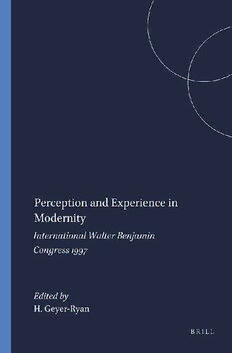
Perception and Experience in Modernity: International Walter Benjamin Congress 1997 PDF
Preview Perception and Experience in Modernity: International Walter Benjamin Congress 1997
Perception and Experience in Modernity Benjamin Studien Studies 1 Edited by Helga Geyer-Ryan Paul Koopman Klaas Yntema Editorial Board Jeanne Marie Gagnebin (Sao Paulo) Helga Geyer-Ryan (Amsterdam) Bettine Menke (Frankfurt/Oder) Samuel Weber (Los Angeles) Irving Wohlfarth (Reims) International Walter Benjamin Assocation Institute of Comparative Literature University of Amsterdam Spuistraat 210 NL-1012 VT Amsterdam E-mail: [email protected] URL: http:// www.hum.uva.nl/benjamin Amsterdam/New York, NY 2002 Picture: Gisèle Freund, Walter Benjamin, Pontigny 1939 Design: Taluut and Koopman. The paper on which this book is printed meets the requirements of ‘ISO 9706:1994, information and documentation — Paper for documents — Requirements for permanence’. Printed in The Netherlands. Benjamin Studies, a Rodopi Series is available in PDF, free online for print subscribers, via CatchWord/ingenta. ISSN: 1568-5098 ISBN: 90-420-1285-4 © Editions Rodopi B.V., Amsterdam – New York, NY 2002 References to Benjamin’s Gesammelte Schriften(ed. Rolf Tiedemann and Hermann Schweppenhäuser, Frankfurt am Main (Suhrkamp) 1972–89) are included in parentheses within the text. The roman numeral designates the volume, the arabic numeral the page number. Contents Perception and Experience in Modernity Helga Geyer-Ryan 9 To speak of Walter Benjamin George Steiner 11 Between a Human Life and a Word.Walter Benjamin and the Citability of Gesture Samuel Weber 25 Lost in Translation.Vom Verlust des Bilddenkens in Übersetzungen Benjaminischer Schriften Sigrid Weigel 47 Walter Benjamin and the Idea of a Technological Eros.A tentative reading of Zum Planetarium Irving Wohlfarth 65 A Talk with Mona Jean Benjamin,Kim Yvon Benjamin and Michael Benjamin Martin Jay, Gary Smith 111 Zeit und Glück.Phantasmagorien des Spielraums Burkhardt Lindner 127 ‘Jetzt’.Benjamin zur historischen Zeit Werner Hamacher 145 Walter Benjamin,Remembrance and the First World War Martin Jay 185 Revolutionary Time: The Vanguard and the Avant-Garde Susan Buck-Morss 209 Perception and Experience in Modernity The first volume of Benjamin Studies publishes the keynote lectures of the first Congress of the International Walter Benjamin Association, which took place in Amsterdam, July 1997. Its title bears witness to the most central concepts of Benjamin’s philosophy of culture. Strongly influenced as he was by Kant, Benjamin never lost his inclination to analyse the components of reality as fashioned by our- selves. Because he was also a materialist, for him the modes of fashioning were shaped in turn by the times and places we occupy in history. As a consequence, Benjamin’s theory assigns a pivotal role in the interaction between the world and its inhabitants to the media: language with its plethora of discourses, the arts, and the technology of reproduction. The historical and social development of the media is, translated, according to him, into our instruments of perception, and this perception constructs the elements of the world, the knowledge of this construction and the knowledge of the constructor. The self-knowledge of the constructor is what we call ‘experience’. Within this broad epistemological framework, the diversity and complexity of Benjamin’s project acquires a fundamental coherence and is therefore able to accom- modatethe temporal volatility of the phenomena of our world. It’s not surprising, therefore, that Perception and Experience in Modernity offers the most stimulating variety of topics, and that the keynote lectures reflect merely an intensification of interest in certain areas within a much larger field of investigation. The texts presented here pinpoint the central preoccupations of today’s debates amongst Benjamin scholars, preoccupations which are themselves responses to our own his- torical imperatives. Perception and Experience in Modernity is also a memorial to the late Wil van Gerwen and bears witness to the strength of his vision. This young Dutch scholar laid the foundations for the International Walter Benjamin Association and played the most crucial part in getting this first congress off the ground before his untimely death in 1995 at the age of 44. Wil van Gerwen’s vision was to bring together on the neutral terrain of the Netherlands all the different factions engaged in the study of Walter Benjamin, factions which had often proved so hostile to each other in the past. Without wishing to ignore or disguise their differences, Wil van Gerwen wanted the combined intellectual forces at the congress to unite in the exploration of Benjamin’s extraordinary universe. By means of the Association, he sought to bring Benjamin scholars together in all their diversity on an interna- tional scale and so promote the global dissemination of Benjamin’s equally diverse and irreducible mode of thought. 9
